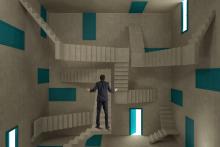At VMworld Monday, VMware unveiled a hyper-converged infrastructure appliance, taking the wraps off a not-so-secret project.
Called EVO: RAIL, the product combines VMware software, including vSphere, Virtual SAN (VSAN), and vCenter Log Insight, with a 2U/4-node hardware platform provided by VMware partners. VMware has specific requirements for the platform and a single SKU procurement model for its EVO line, which it touts as making it quicker and easier to deploy and operate a software-defined data center.
EVO: RAIL is what was reported variously as Project Mystic and Marvin earlier this year, said Mornay Van Der Walt, vice president of the new emerging solutions group at VMware. "There was a lot of speculation out there," he told us. Some of that speculation had VMware going into the hardware business.
"First and foremost, VMware is a software company. The way we'll make EVO: RAIL a reality is through a broad partner ecosystem."
Partners, which will offer the product on their price books, will be announced at VMworld this week in San Francisco, he said.
VMware is targeting its hyper-converged appliance at the VDI market, remote and branch offices, and virtual private clouds offering by its service provider partners. The company sees VDI as the most promising, making up 50% of potential use cases for the appliance.
With EVO: RAIL, VMware jumps into a fast-growing and crowded market. According to Gartner, the market for integrated systems will exceed $6 billion this year, up 50% from last year. In a report released in June, the research firm described integrated systems as combinations of server, storage, and network infrastructure, sold with management software.
Gartner cited perceived lower operating costs, increased automation, and simplified sourcing and support as among the market drivers. Countering the growth is a perception that integrated systems have premium pricing and enterprise interest in using internal skills to integrate IT.
Vendors selling converged infrastructure include Cisco, Dell, HP, Nutanix, SimpliVity, and of course VCE, the joint effort from Cisco, EMC, and VMware. Cisco, for its part, is expected to announce additions to its Unified Computing System (UCS) product line next week.
The hyper-converged category of integrated infrastructure surfaced about three years ago when a few startups rolled out "a new type of converged IT infrastructure combining storage and compute not just in a preconfigured rack, but also in a single brick that could serve as the basis of a scale-out system," Network Computing contributor Howard Marks wrote in a blog post.
Van Der Walt described converged infrastructure like VCE Vblocks as taking longer to implement and a bigger financial commitment than the hyper-converged EVO:RAIL, which he said represents the first building block within the rack in a data center and the first product in the EVO line (EVO stands for evolution).
Van Der Walt said VMware is being prescriptive with its requirements for the EVO hardware platform in order to keep the model simple. The company envisions a franchise-like model, similar to that of fast-food restaurants.
The 2U/4-node platform's per-node requirements include a 400 GB SSD to accommodate VSAN read/write cache, three 1.2 TB hard disk drives for the VSAN data store, up to 192 GB of memory, and Intel Xeon E5 2620 v2 6-core CPUs.
The appliance connects to one or more top-of-rack switches via 10 gigabit copper or fiber.
EVO: RAIL can be scaled out to four appliances, for a total of 16 ESX hosts. One appliance supports 100 general-purpose server workloads, or up to 250 workloads for VDI.
As for future versions of EVO, Van Der Walt said, VMware will "keep the door open to all software assets in our portfolio, including NSX."
VMware expects partners will be able to ship RAIL appliances in the second half of this year.








